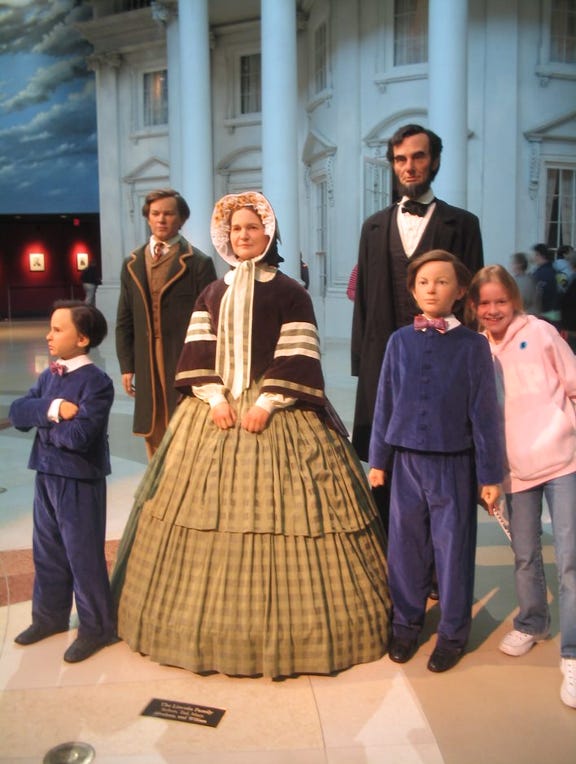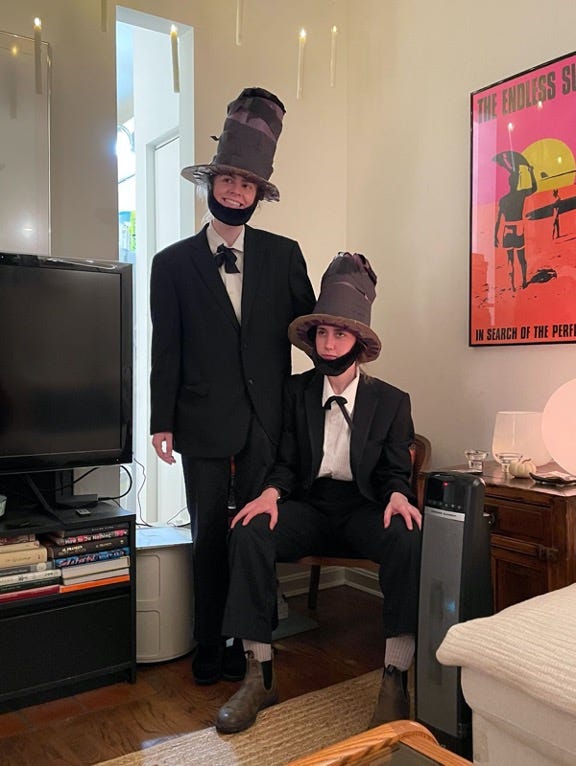Guest Post: If He was Queer, Would He Still Hold a Place in Your Heart?
Shaun Peterson’s ‘Lover of Men: The Untold Story of Abraham Lincoln’
The Yearning Rating: ✰✰✰½
Romance: ✰✰✰✰
Sex: ✰✰
Storytelling: ✰✰✰
Performance: ✰✰✰✰
Yearning: ✰✰✰✰✰
Today’s guest post is co-written by friends of The Yearning and D.C.’s hottest it couple Abby Conners and Charlotte Cummins! Besides being two smarties, years of research make them uniquely qualified to speak on the topic of Lincoln’s alleged queerness…will they convince you? Enjoy!
Written by Abby Conners & Charlotte Cummins
We are undeniably in the midst of a Lincoln renaissance. Regular people and The View hosts alike have sung the praises of Cole Escola’s acclaimed-and-extended off and then on-Broadway run as Mary Todd Lincoln in their stage play “Oh Mary!”, an irreverent retelling of the life and misery of our sixteenth First Lady. This rendering is inherently queer with Escola at the helm, a welcome perspective for those of us desperate to achieve a single circle on the “Abraham Lincoln” and “Gay” Venn diagram. Shaun Peterson’s new documentary Lover of Men: The Untold Story of Abraham Lincoln endeavors to do just that. Peterson creates a quick-paced melange of historian testimonials and provocative actor portrayals to build the case that Lincoln was at least a little bit gay.
Don’t be swayed from watching if a historical deep dive isn’t necessarily your bag. Woven throughout Lincoln’s political rise is a series of flings and codependent relationships with various men. Abby did don her favorite gauzy button-down sleep shirt for our Lover of Men watch party as a cheeky homage to a scandal of the time: a “handsome close friend” of Lincoln’s known to be sleeping at the Cottage in the President’s bed while his wife was away, seen creeping through a hallway wearing only the President’s white night shirt (hot! Salacious!). If you take with you nothing else, know this, Abraham Lincoln absolutely had a type: well-to-do twunks in search of upwardly mobile bears.
We approach this review with rock solid credentials: (1) we are both gay, (2) Abby hails from the Land of Lincoln, our state’s proudest export (see below), and (3) through word of mouth and Halloween performance art (again, see below), we have spent the last four years evangelizing the Good Word that Abraham Lincoln was gay.


As dogged researchers on this topic, we were convinced we would glean no new information from Peterson’s one hour and fifty-one-minute persuasive work. But we were pleasantly surprised to come away with new evidence to support our working theory. In addition to thrusting him squarely into the LGBTQ community, Peterson leans heavily on queer academics and activists to elevate Lincoln’s alleged queerness from a pet theory to a paradigm through which we might understand science, race, religion, and the contemporary struggle for queer liberation.
We struggled to write this review without it becoming a thesis for BA in History. The documentary is dense and tries to do a lot of social commentary, and quickly. But, if you come to The Yearning seeking stolen glances, lingering fingertips, and suspiciously amorous hugs between friends, you will not leave Lover of Men disappointed. Peterson makes use of steamy actor portrayals of Lincoln and his lovers (men in nightshirts! Spooning!), intimate black-and-white portraits of nineteenth-century friends (very “and they were roommates”), and narration of suggestive letters between old friends/lovers (“Yours forever, A. Lincoln”—swoon!).
He also taps into traditional historical documentary construction, but this is not your dad’s Ken Burns documentary. We were happily scandalized by a well-cast “Young Abe” on the receiving end of some not-so-subtle heavy petting. Peterson uses interview setting wisely with backdrops attuned to speakers’ expertise—historians in libraries and moody academic offices and political activists and progressive thinkers in expansive, sun-filled spaces. These subtle visual cues indicate that there is a true chorus of diverse voices pointing to one singular Truth (say it with me: Abe was gay).
Lover of Men takes viewers through Lincoln’s early years to his days as a young lawyer in Springfield. The exposition showcases Lincoln’s unique lack of interest in women (like so acutely everyone he knew was including this tidbit in their letters to friends). Lincoln’s most significant relationship was with a Springfield-based store owner, Joshua Speed, the “love of his life” and “soulmate”. The viewer witnesses a recreation of their love at first sight, with Lincoln rolling up to Springfield and entering Speed’s shops seeking a spare room. Speed offers his own, ready with a single cot to share, and Lincoln, upon seeing the modest accommodations, bites his lip, sets down his bag, and stays for four years.
The documentary sets up the tension of the nineteenth century between the hyper-religious-traditional-hetero-marriage schtick and the reality of homosocial relationships (read: almost universal segregation of men and women socially outside of marriage). This proximity and gender-exclusivity created fluid dynamics among friends who engaged without shame in intimate emotional and, sometimes, physical relationships between one another. This is (1) hot, and (2) important framing for how we now understand old-timey queerness before straight people tried to make it weird.
Speed is credited with making Lincoln the figure he later becomes, as the film puts it (sorry Cole): “Mary Todd gets the credit, but Joshua Speed did the work”. He transformed Lincoln from a gangly, “folksy” young lawyer with perennial bedhead to a credible national political figure. During a visit to his family plantation, Speed exposed Lincoln to the realities of slavery, ostensibly setting him on a path to emancipation.
For a documentary that advocates for fluidity and rejects a strict binary, we found one element of Peterson's storytelling a bit too narrow. Lincoln was clearly enamored with Speed, but there is little exploration into Lincoln’s long life as a husband and father. The film would benefit from a more earnest acknowledgement of the spectrum of queerness in Lincoln’s own life and how queer people can and do engage earnestly in straighter, more traditional family life.
Lover of Men draws a throughline from abolition, to Black liberation, to queer liberation. This is where we see Peterson move very quickly through one hundred and sixty years of sociopolitical history. Historians and academics illuminate how Freud and other early twentieth-century psychologists invented the narrow categories of human sexuality and established rigid hierarchies of sexual behavior and “perversion”. It is a relatively recent development that “what you do” is “who you are” (AKA before ~1920, Charlotte and I would have just been “sharing a double bed” for four years). With categories rigidly set, it becomes easier to other, marginalize, and villainize specific groups of people. The film draws clear parallels between how both Christianity and science were weaponized to defend slavery and, later, Jim Crow laws and how now-categorized queer people were easily swept up in that tide. Straight culture became enamored with the mythos of heteronormativity, with men clinging closely to super-American Paul Bunyan-esque hypermasculine tropes in an effort to distance themselves from queer people and the box they put them in. Being on the right side of the binary became crucial to survival.
The culture shifted and with it went the fluidity and flexibility of same-sex intimate relationships. Anti-queer and anti-Black politicians, physicians, and priests did (and continue to do) major damage to both groups. For those constitution minded, the film offers a tidy retrospective into the fourteenth amendment as a pathway to racial equality and points to it as the legal pathway to emerging sexuality and gender equality. A constitutional legacy of our favorite gay president.
Big takeaway for us: how you do or don’t talk about things really, really matters. Historians only have the power of speculation. The reality is that the taxonomy of queerness did not exist during Lincoln’s life. So, we’re left to look at how he spoke, what he wrote, and how he lived his life to make conclusions about his desires. Much of our understanding of Lincoln’s life comes after his death from twentieth-century historians. Lover of Men invokes Carl Sandburg’s writing on Lincoln and Speed’s “streaks of lavender” and “spots as soft as violets”—queercoding—in the foreword of his 1926 biography on the late President. In later editions, Sandburg edited these descriptions out, erasing Lincoln’s queerness in the effort to distance himself from gay sympathizers. Despite his edits, we were thrilled to discover a fellow early Abe-was-gay truther.
Both Fourth-grade Abby (apparently) and politicians on both sides of the aisle alike earnestly worship at the altar of Abraham Lincoln and his accomplishments (informed by true leadership from Black abolitionists). Ultimately, the film proposes something to viewers: If you can accept a queer Lincoln, you can accept queer people overall. We concede there is often some inner peace and better visibility as a result of aligning with specific identities. But, do we sacrifice our complexity or our nuance in understanding others if we cling too tightly to strict labels? This film rests in this tension of acknowledging queerness, but refusing the monolith. As Dr. Jean Baker suggests in one of her scenes, “it doesn’t need to be all Mary, all heterosexual or all homosexual. It can be a smattering of both”.
We recommend this film to you if you like presidential biographies, gender and sexuality theory, or wish The History Channel were a little bit sexier. Before we leave you: we would like to present for the readers’ consideration, without comment, a piece of evidence not offered in Lover of Men, President Lincoln’s embroidered carpet slippers.







